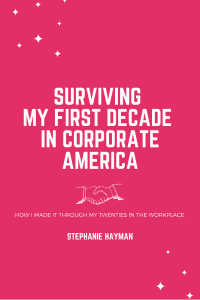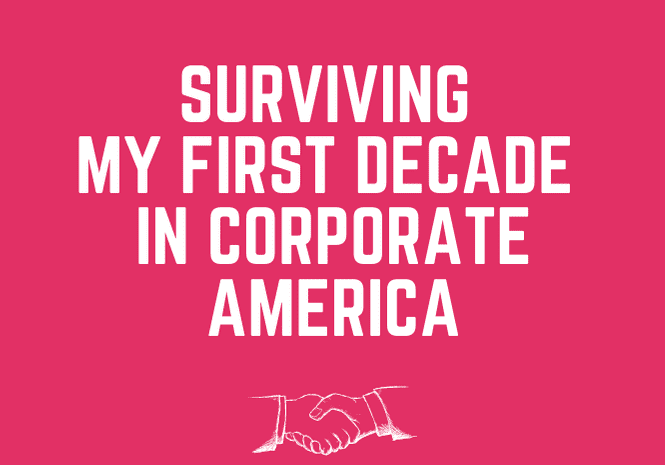Book Review: ‘Surviving My First Decade in Corporate America’
Reviewed by Jeffrey Sanzel
At the outset, I must confess that I am allergic to self-discovery. I break out in hives of disinterest. Mostly when I read these accounts, they make me want to be a less successful, unhappier person. Call it the Self-Enlightenment Repellent Effect. And yet …

Who would think that a book entitled Surviving My First Decade in Corporate America, written by a thirty-year-old marketing strategist, would be one of the most engaging and enlightening books of the last year?
Stephanie Hayman’s slender tome is a clever, informative, and beautifully written account of her twenties in the workplace. Her prose is crisp, laugh-out-loud funny, and smart. The book is flawlessly constructed and her advice is logical and practical; her point-of-view is personal, which makes it all the more valuable. She never speaks in generalities and backs up her ideas with personal experiences and well-placed anecdotes. Her style is breezy and conversational but never feels flippant or dismissive.
This is a tremendous book.
Her target audience is young people entering the professional world for the first time. Upon graduation, the book should be required reading, perhaps handed out with diplomas if necessary. While she deals predominantly with corporate, office, and business workplaces, there is a universality to her perspective that applies to most jobs and careers.
The book is composed of about two dozen quick chapters, with some shrewd interludes. She actually opens the book with “An Ode to Change,” composed of eight comical haikus, reflecting her shift from college to the world beyond. A personal favorite: “Met for two hours today/This could have been an e-mail/What a waste of time.”
Her prologue sets the tone for what is to come: When I was a bright-eyed and bushy-tailed 22-year-old college senior, I wish I had some insight into what to expect as I entered the business world. I imagined that I’d pop out of bed with a smile on my face, shut the alarm on the first ding, and brush my teeth with such gusto, feverishly anticipating the exciting work day ahead. LOL, clearly my young self had quite the active imagination and didn’t quite grasp the concepts of commuting, 9 a.m. meetings, and overall exhaustion.
And so it began and so it begins.
The first chapter is titled “Social Paparazzi vs. Background Checks.” Right out of the starting gate, she tackles the dangers and pitfalls of social media and how it effects how one is perceived in the greater world. She strikes home with the reality that those bar pictures might have been fun at the time, but they will do you no good (and possible ill).
In “Trading College for a Cubicle,” she gives an overview of some of the unexpected challenges in her first job. An amusing story about a difficult bad weather commute is followed by an honest, self-revelatory conclusion: “As much as everyone tells you their stories, and you feel like you know what to expect, you will never truly understand or grasp the transition to professional life until you experience it yourself.”
“Friends, Foes and Corporate Beaus” deals with romance in the workplace. It can be done as long as you are open and honest. It worked for her but she cautions “the personal and professional not only intersect, but become emotionally entangled with one another.” This segues into “Spoiler Alert: Work/Life Balance Doesn’t Exist.” After years of hearing how important it is to separate work and life, she makes the point that it is more myth than method. “Working doesn’t stop and life doesn’t stop” — and that’s not necessarily a bad thing. It is about sensible integration.
One of the most pointed chapters — “Sorry Doesn’t Cut It!” — addresses the mis- and over-use of “I’m sorry.” (This was an ah-hah moment for me and will resonate with any reader.) In an age of responsibility deflection, this is a reminder to choose the words that address what is actually happening, rather than resort to meaningless clichés and social dodges. Her advice on networking is succinct and pragmatic; anyone wondering how to begin developing the necessary skills are given a sensible and accessible approach.
Hayman pulls no punches. “Asking for a raise without proper justification just straight up makes you look dumb. As a millennial asking for a raise without anything to back up your claim, just makes you look like … well, a millennial.”
 She takes on challenging topics with the same clear-headed, no-nonsense tactic: organizational culture, the importance of personal days, interaction in a multigenerational workforce, gender disparity, graduate degrees, and, ultimately, the pandemic. No matter how difficult the situation, she is neither self-aggrandizing or self-pitying.
She takes on challenging topics with the same clear-headed, no-nonsense tactic: organizational culture, the importance of personal days, interaction in a multigenerational workforce, gender disparity, graduate degrees, and, ultimately, the pandemic. No matter how difficult the situation, she is neither self-aggrandizing or self-pitying.
One of the interludes compares reactions of her age twenty-two self to her age twenty-nine self. She covers cold calls, meetings, traveling, high heels, getting ready, bosses, emails, and availability, all with wicked accuracy and a sense of how we grow. It is also a reflection of how priorities mature with experience.
Throughout, there is a refrain of learning to trust your gut and speaking up and speaking out: “In the workplace if you don’t speak up, you’re forgotten. You become the friend that shows up to every family gathering without bringing an app, dessert or bottle of wine. Quickly everyone begins to wonder: why are you here and what do you actually contribute?”
At the end of each chapter, she has “What I knew then, but know now.” It is composed of three points summing up the material addressed in the previous pages. They are as witty and well-crafted as the body of the chapter and offer an excellent way for the book to be used as an ongoing source. After the reader has gone through the entire book, he or she can use those points as a constant refresher. Once again, the book is highly entertaining and completely practical.
“This is not high school and you are not defined by a ‘label.’ Every day you have a new chance to reinvent or grow your existing persona. Who you are at 22 will not be who you are at 30. Don’t lump yourself in a box, and celebrate all of the differentiated parts of you.” Wise words and good advice.
It would be easy to quote the entire book in this review. Instead, go out and get a stack of copies for the young people in your life who are graduating college (or even high school). Along with the card and the check, give them Stephanie Hayman’s Surviving My First Decade in Corporate America. And while you’re buying a copy for them, pick up a copy for yourself. You won’t be sorry.
Author Stephanie Hayman is a marketing strategist with 8+ years industry experience at Fortune 500 companies and boutique businesses. A graduate of Stony Brook University, the Hauppauge resident frequently publishes her thoughts on her blog, www.bystephaniehayman.com and will host a virtual and in-person event at SBU for current students and alumni this coming fall.
Surviving My First Decade in Corporate America is available online at Amazon, iBooks, Google Books and Barnes & Noble.







